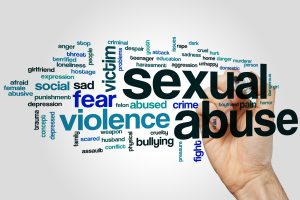When Sexual Abuse Happens to Adults
 Although sexual abuse is a form of abuse that often occurs with children, anyone can become a victim of sexual abuse at any age. Sexual abuse is any unwanted sexual activity from perpetrators using force, using threats, or taking advantage of the victim. Sexual abuse is a crime where the victim and the perpetrator may or may not know each other.
Although sexual abuse is a form of abuse that often occurs with children, anyone can become a victim of sexual abuse at any age. Sexual abuse is any unwanted sexual activity from perpetrators using force, using threats, or taking advantage of the victim. Sexual abuse is a crime where the victim and the perpetrator may or may not know each other.
Sexual abuse can involve touching and non-touching behaviors. Some examples of non-touching behaviors that can count as sexual abuse involve exhibitionism, exposing a child to pornography, voyeurism, or looking at a child’s naked body. When it comes to sexual abuse, children are the primary vulnerable targets; however, adults are also at risk of becoming victims of sexual abuse.
What is adult sexual abuse?
Adult abuse is a form of abuse where a perpetrator is exerting power and dominance over another adult aged 18 or older in a way that is harmful and exploitative. Adult abuse is capable of being a one-time event, although abuse can also occur over an extended period of time.
With sexual abuse against a vulnerable adult, anyone is likely to be a perpetrator – for example, the person’s relative, friend, partner, home healthcare worker, or nursing home staffer. Similar to sexual abuse, adult abuse can be committed by one person or a group of perpetrators.
Are some adults more vulnerable to sexual abuse?
Although any adult is at risk of sexual abuse, there are particular adults who perpetrators may target specifically due to their vulnerability. A vulnerable adult is one who is not able to care for themselves or protect themselves from significant harm.
Some examples of vulnerable adults include the elderly, those with a learning disability, physical disability, mental health disorder, long-term illness or condition, unhoused, or an adult who is unable to prove that he or she is capable of making decisions.
What categorizes an individual as a vulnerable adult depends on the particular specifics of the case. Keep in mind that some adults may be considered vulnerable temporarily due to illness or life circumstances.
Why do vulnerable adults fall victim to sexual abuse?
There are several reasons why vulnerable adults are at risk of falling victim to sexual abuse. One of the reasons can be lack of mobility. Many elderly vulnerable adults are immobile and unable to get away from their perpetrators. A lack of mobility and freedom may also prohibit them from speaking to someone and informing them of the abuse that they are suffering.
Another reason why vulnerable adults are at risk is that many do not know that inappropriate sexual contact is inappropriate. Some adults with mental disabilities are not familiar with what is sexually appropriate and what is not; this makes it easier for the perpetrator to exploit and take advantage of them.
Another reason is that similar to the lack of sexual knowledge, a victim may be easily fooled and assume that he or she is in a consensual relationship. Or, the perpetrator has threatened the victim physically or verbally. A perpetrator could also isolate the victim, keeping them away from their family and friends and preventing them from reporting the abuse.
What are some examples of sexual abuse against adults?
Some examples of sexual abuse that can be committed against adults are rape, date rape, sexual harassment, indecent exposure, stalking, voyeurism, grooming, and image-based sexual abuse like revenge porn. Similar to children who are victims of sexual abuse, sexual non-touching acts can also be categorized as a form of sexual abuse.
Any sexual behavior that intimidates a person and makes them feel uncomfortable can be classified as sexual abuse against an adult. If a vulnerable adult is being sexually abused in exchange for something like food, drugs, protection, or affection, sexual abuse can then fall into the category of sexual exploitation.
What are some of the long-term effects of sexual abuse in adults?
One of the long-term effects of adult sexual abuse is depression. While there are several types of mental health disorders associated with sexual abuse, depression is typically the most common. Victims of sexual abuse may blame themselves for the abuse they experienced, as well as internalize the abuse that has happened to them.
These feelings produce a cycle of negative thinking. The constant negative thinking leads to feelings of worthlessness and avoidance of relationships. Some of the symptoms affiliated with depression include problems with sleep, thoughts of suicide, and disturbed eating patterns.
Another long-term effect is anxiety. Feelings of fear and stress that the victim experiences during the times that they are abused can continue throughout their life. Some of the effects of anxiety include chronic anxiety, panic attacks, and general tension. A victim’s relationships may suffer negative effects from sexual abuse.
The important aspects of the victim’s relationships, like trust and intimacy, are aspects that he or she may struggle with for the rest of their life. The victim may also be obsessed with his or her power dynamics in the relationship. Being sexually abused makes a person feel powerless, and as a result, the victim may attempt to overcompensate and control every detail in the relationship. At Taylor & Ring, we understand that treatment for sexual abuse can require many types of care. We can help you find a counselor or therapist who can help you work through these feelings, and regain your sense of power over your life and your future.
You can trust the Los Angeles attorneys of Taylor & Ring to provide you and your loved one with honest, reliable, and aggressive representation. Call us today at 310-209-4100 or complete a contact form to schedule a confidential and free initial consultation. We value each of our clients and continuously strive to provide them with high-quality representation.

John C. Taylor is one of the most accomplished and nationally recognized trial lawyers in California. The broad variety of cases he has tried during his career is matched by few attorneys, trying more than 125 cases to verdict, including: police shootings and civil rights, sexual abuse, serious personal injury, wrongful death, products liability, insurance bad faith, and employment.
Read more about John C. Taylor.

